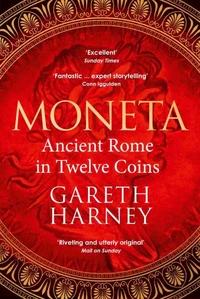Nomos. A History of Ancient Greece in Twelve Coins
Par :Formats :
Actuellement indisponible
Cet article est actuellement indisponible, il ne peut pas être commandé sur notre site pour le moment. Nous vous invitons à vous inscrire à l'alerte disponibilité, vous recevrez un e-mail dès que cet ouvrage sera à nouveau disponible.
Disponible dans votre compte client Decitre ou Furet du Nord dès validation de votre commande. Le format ePub protégé est :
- Compatible avec une lecture sur My Vivlio (smartphone, tablette, ordinateur)
- Compatible avec une lecture sur liseuses Vivlio
- Pour les liseuses autres que Vivlio, vous devez utiliser le logiciel Adobe Digital Edition. Non compatible avec la lecture sur les liseuses Kindle, Remarkable et Sony
- Non compatible avec un achat hors France métropolitaine
 , qui est-ce ?
, qui est-ce ?Notre partenaire de plateforme de lecture numérique où vous retrouverez l'ensemble de vos ebooks gratuitement
Pour en savoir plus sur nos ebooks, consultez notre aide en ligne ici
- Nombre de pages352
- FormatePub
- ISBN978-1-5299-4872-1
- EAN9781529948721
- Date de parution06/08/2026
- Protection num.Adobe DRM
- Infos supplémentairesepub
- ÉditeurVintage Digital
Résumé
It was the Greeks that invented money as we know it, striking the first coins in the seventh century BC. Before long this innovative idea of a portable metallic store of wealth spread across the waves of the Mediterranean. But these coins were more than simple units of exchange; they quickly became artistic masterpieces crafted in gold and silver and endure today as some of the most important surviving examples of Ancient Greek art.
More important, they advertised the power and virtues of each polis with patriotic fervour; for the empire of Greece was not a single entity but a rich mosaic of wholly distinct city-states spread across three continents. Yet for all their unique identities and rivalries, these states were bonded by their shared worship of a colourful gallery of gods, their devotion to art, literature and philosophy, and the courage and skill of their citizen-soldiers.
In this thrilling numismatic adventure Gareth Harney introduces us to twelve fascinating coins that provide the perfect introduction to Ancient Greece. We witness the birth of democracy on a sacred hilltop overlooking the Acropolis, battle invading Persians in an existential war on land and at sea, take part in the bitter conflict between Athens and Sparta, and march alongside Alexander the Great as he carries Greek culture all the way to India.
More important, they advertised the power and virtues of each polis with patriotic fervour; for the empire of Greece was not a single entity but a rich mosaic of wholly distinct city-states spread across three continents. Yet for all their unique identities and rivalries, these states were bonded by their shared worship of a colourful gallery of gods, their devotion to art, literature and philosophy, and the courage and skill of their citizen-soldiers.
In this thrilling numismatic adventure Gareth Harney introduces us to twelve fascinating coins that provide the perfect introduction to Ancient Greece. We witness the birth of democracy on a sacred hilltop overlooking the Acropolis, battle invading Persians in an existential war on land and at sea, take part in the bitter conflict between Athens and Sparta, and march alongside Alexander the Great as he carries Greek culture all the way to India.
It was the Greeks that invented money as we know it, striking the first coins in the seventh century BC. Before long this innovative idea of a portable metallic store of wealth spread across the waves of the Mediterranean. But these coins were more than simple units of exchange; they quickly became artistic masterpieces crafted in gold and silver and endure today as some of the most important surviving examples of Ancient Greek art.
More important, they advertised the power and virtues of each polis with patriotic fervour; for the empire of Greece was not a single entity but a rich mosaic of wholly distinct city-states spread across three continents. Yet for all their unique identities and rivalries, these states were bonded by their shared worship of a colourful gallery of gods, their devotion to art, literature and philosophy, and the courage and skill of their citizen-soldiers.
In this thrilling numismatic adventure Gareth Harney introduces us to twelve fascinating coins that provide the perfect introduction to Ancient Greece. We witness the birth of democracy on a sacred hilltop overlooking the Acropolis, battle invading Persians in an existential war on land and at sea, take part in the bitter conflict between Athens and Sparta, and march alongside Alexander the Great as he carries Greek culture all the way to India.
More important, they advertised the power and virtues of each polis with patriotic fervour; for the empire of Greece was not a single entity but a rich mosaic of wholly distinct city-states spread across three continents. Yet for all their unique identities and rivalries, these states were bonded by their shared worship of a colourful gallery of gods, their devotion to art, literature and philosophy, and the courage and skill of their citizen-soldiers.
In this thrilling numismatic adventure Gareth Harney introduces us to twelve fascinating coins that provide the perfect introduction to Ancient Greece. We witness the birth of democracy on a sacred hilltop overlooking the Acropolis, battle invading Persians in an existential war on land and at sea, take part in the bitter conflict between Athens and Sparta, and march alongside Alexander the Great as he carries Greek culture all the way to India.


